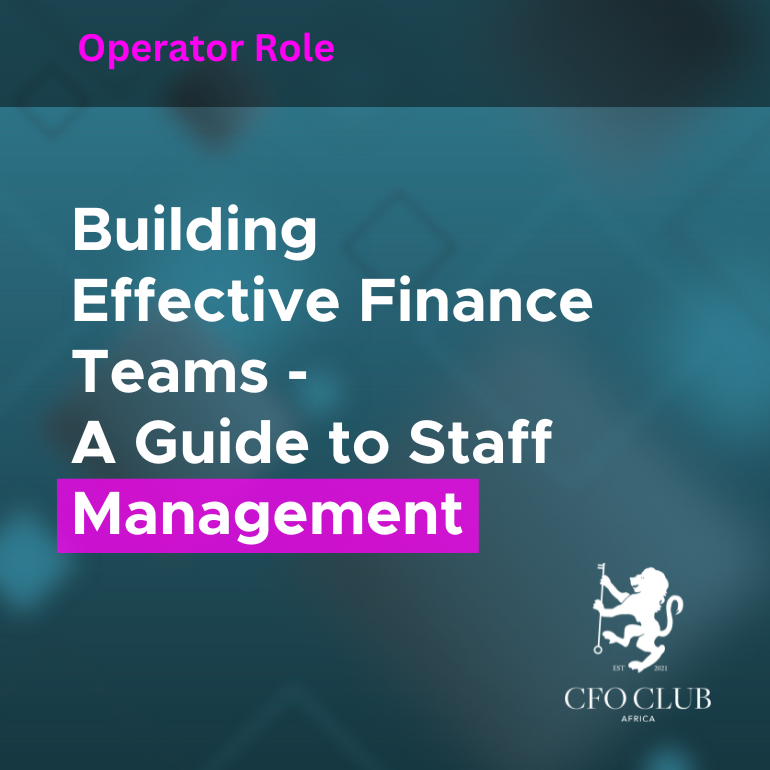Building Effective Finance Teams: A Guide to Staff Management
Building a top-notch finance team is like assembling a puzzle where each piece needs to fit perfectly. As a CFO, your role goes beyond crunching numbers—it’s about creating a team that’s dynamic, cohesive, and ready to tackle the financial challenges of today and tomorrow. Imagine having a team that not only delivers accurate financial reports but also drives strategic initiatives, contributing to the growth and success of your organization. In this article, we’ll explore practical strategies and real-world examples to help you build an effective finance team that can elevate your company to new heights. So, let’s dive in and discover how you can transform your finance department into a powerhouse of efficiency and innovation.
Understanding the Role of a CFO as an Operator
The role of a CFO as an operator involves ensuring that the finance team operates efficiently and effectively. This requires a focus on processes, systems, and people. Effective staff management is at the heart of this role, as it directly impacts the team’s ability to deliver accurate financial insights, manage risks, and support strategic decision-making.
Key Elements of Effective Finance Team Management
To build and manage an effective finance team, CFOs should focus on the following key elements:
Recruitment and Onboarding:
Identify the Right Skills: Understand the skills and competencies needed for each role within your team. This includes technical skills like accounting and financial analysis and soft skills like communication and problem-solving.
Structured Onboarding: Develop a comprehensive onboarding program that familiarizes new hires with company culture, processes, and expectations. A well-structured onboarding process can significantly reduce the time it takes for new employees to become productive.
Fostering a Collaborative Culture:
Encourage Open Communication: Create an environment where team members feel comfortable sharing ideas, asking questions, and providing feedback. Regular team meetings and open-door policies can help facilitate this.
Cross-Functional Collaboration: Encourage collaboration between finance and other departments. This can lead to a better understanding of business needs and more informed financial decisions.
Developing Talent:
- Continuous Learning: Invest in training and development programs to enhance the skills of your team members. This could include workshops, online courses, or mentorship programs.
- Career Development Plans: Work with each team member to develop a personalized career development plan. This not only helps employees grow but also increases their engagement and retention.
- Performance Management:
- Set Clear Objectives: Establish clear, measurable objectives for each team member. This helps employees understand their roles and how they contribute to the team’s success.
- Regular Feedback and Reviews: Provide regular feedback and conduct performance reviews to discuss progress, recognize achievements, and identify areas for improvement.
- Promoting Work-Life Balance:
- Flexible Work Arrangements: Offer flexible work arrangements, such as remote work or flexible hours, to help employees balance their personal and professional lives.
- Health and Well-being Initiatives: Implement initiatives that support the physical and mental well-being of your team, such as wellness programs or stress management workshops.
Practical Examples
Here are two practical examples of successful finance team management:
Example 1: Implementing Cross-Training for Enhanced Flexibility
Company: A leading retail company in South Africa
Challenge: The finance team faced difficulties in managing workload during peak periods, leading to increased stress and decreased productivity.
Solution: The CFO introduced a cross-training program where team members were trained in multiple roles within the finance department. This allowed employees to step into different roles when needed, providing greater flexibility and reducing workload pressure during peak times.
Outcome: The cross-training program improved team morale, increased productivity, and reduced stress levels. It also led to a more resilient team capable of adapting to changing business needs.
Example 2: Developing a Mentorship Program
Company: A multinational corporation operating in Africa
Challenge: The finance team struggled with high turnover rates and low employee engagement.
Solution: The CFO implemented a mentorship program pairing junior team members with experienced leaders within the organization. This program focused on skill development, career guidance, and fostering a supportive work environment.
Outcome: The mentorship program led to increased employee engagement and satisfaction, reducing turnover rates. It also helped build a stronger, more connected finance team with a clear path for career growth.
Action Points for CFOs
Based on the insights and examples provided, here are some actionable steps you can take to build an effective finance team:
- Conduct a Skills Audit: Assess the current skills and competencies within your team to identify gaps and areas for development.
- Develop a Training Plan: Create a training and development plan that aligns with the needs of your team and the organization’s strategic goals.
- Implement Regular Check-Ins: Schedule regular one-on-one meetings with team members to discuss progress, challenges, and career aspirations.
- Encourage Cross-Functional Projects: Promote projects that involve collaboration between finance and other departments to enhance business understanding and teamwork.
- Review and Adjust Work Policies: Regularly review work policies to ensure they support work-life balance and employee well-being.
Conclusion
Building and managing an effective finance team is a critical component of the CFO’s role as an operator. By focusing on recruitment, fostering collaboration, developing talent, managing performance, and promoting work-life balance, CFOs can create a high-performing finance team that supports the organization’s strategic objectives. Implementing the strategies and examples discussed in this article will enhance team effectiveness and position you as a leader committed to the growth and success of your team and the organization.

